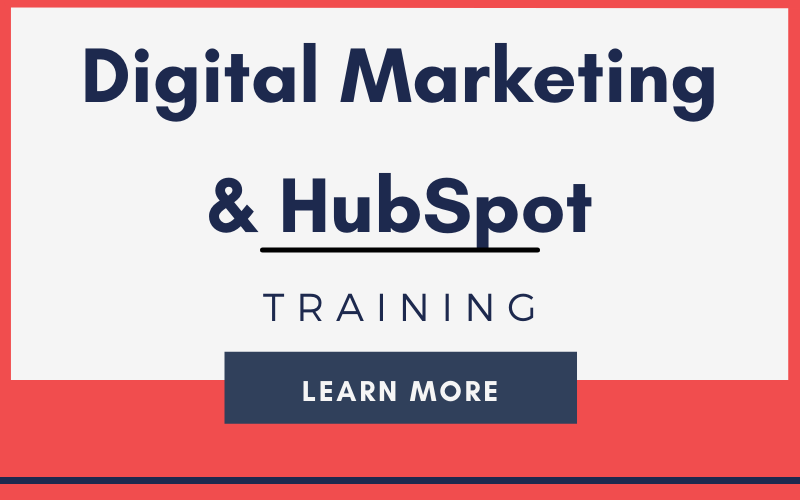7 Reasons Why Digital Marketing Fails


Many business executives realize that in today’s environment, they must have an effective digital marketing plan to achieve their business goals. However, many of their digital marketing campaigns do not achieve their business objectives, leaving executives and managers scrambling to determine why their efforts failed.
We’ve learned through our 20+ years of experience that digital marketing efforts fail when a company is ineffective in the following areas:
- Digital Marketing Strategy
- Budget
- Marketing and Sales Methodology
- Content Marketing
- Marketing and Sales Technology
- Digital Marketing Expertise
- Leadership
Let’s talk more about each of these areas to understand what the problems are and how you can solve them.
Digital Marketing Strategy
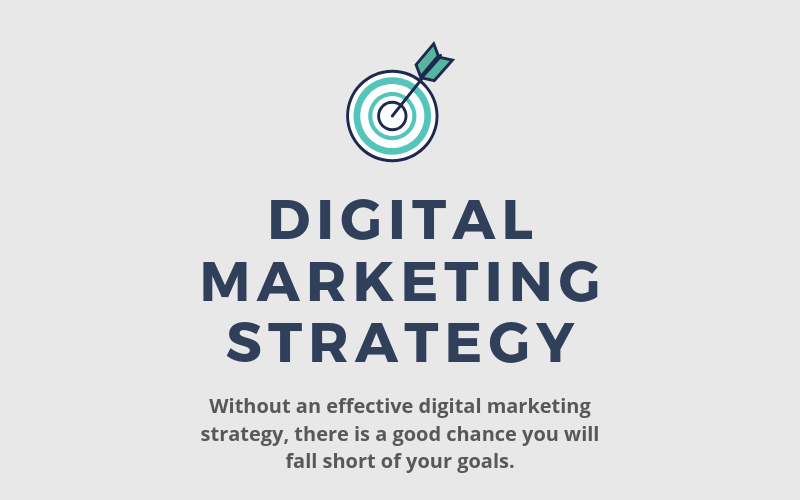
Most companies, and even digital marketing agencies, do not develop a comprehensive digital marketing strategy before they delve into their marketing efforts.
Instead, they quickly launch digital campaigns to see what works.
Even if you know and use best practices, without an effective digital marketing strategy, you will only waste time and money.
The only question will be “how much” will you waste.
An effective digital marketing strategy should include the following:
- Marketing and Sales Assessment of your processes, tools, resources, and performance
- SMART Goals (Specific, Measurable, Attainable, Relevant, Timely)
- Competitive Analysis
- Market Demand Analysis
- Buyer Persona Development
- Value Proposition Development
- Content Marketing Strategy and Plan
- Website Optimization Plan
- Inbound Marketing Methodology
- Digital Channel Strategy
- Digital Marketing Project Plan
Without an effective digital marketing strategy, there is a good chance you will fall short of your goals.
Budget
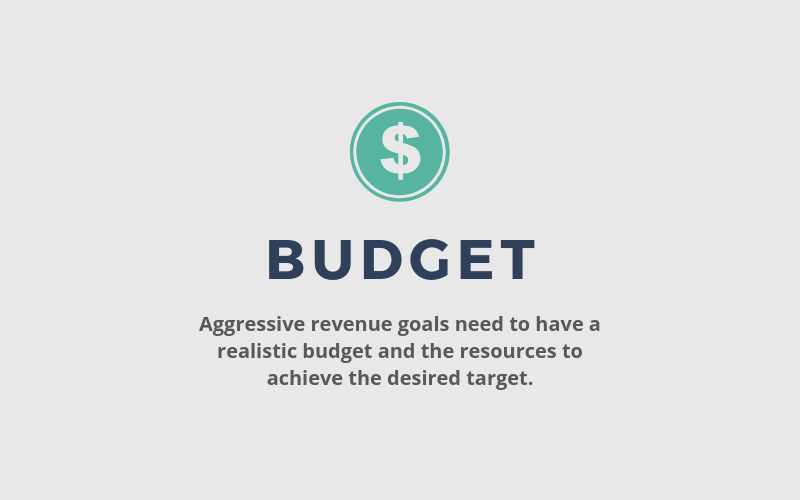
Many executives have lofty goals, but generally want to spend the minimal budget necessary to get there. So, they sign up an agency or push their internal marketing team to meet revenue and customer growth goals.
But many times, they push to achieve aggressive market goals on a minimal budget.
That’s because senior executives typically lack a foundational knowledge of digital marketing.
A digital marketing strategy will identify not only the SMART goals needed to achieve the overall goals, but also the estimated resources required to achieve these goals.
Aggressive revenue goals need to have a realistic budget and the resources to achieve the desired target.
According to a CMO Survey, the estimated marketing budget to achieve targeted revenue is:
- B2B Product – 8.5% of total revenue
- B2B Services – 9.6% of total revenue
- B2C Product – 17.2% of total revenue
- B2C Services – 11.6% of total revenue
In addition, according to Gartner, companies allocate 25% of their overall marketing budget to digital marketing. Marketing technology, which is heavily influenced by digital marketing, accounts for another 29% of the marketing budget.
Therefore, digital marketing impacts an estimated 54% of the total marketing budget. In reality, that number can be much higher depending on your product or service and how much traditional marketing you choose to do, or not do.
While these numbers are estimates, there is no secret formula for digital marketing performance results. The budget required for a start-up, or company with little brand awareness, will be higher to achieve the same results than a company with great brand recognition.
Every digital campaign is different.
You need to be realistic in your goal setting and your digital marketing budget to achieve your business goals.
Inbound Marketing and Sales Methodology
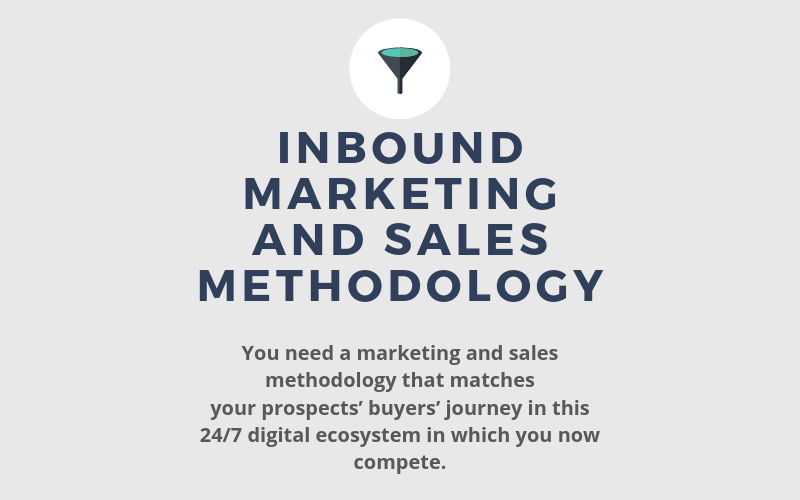
The reality for most businesses is that the marketing and sales methodology to achieve your goals in this digital age has changed and will continue to change.
Marketing generates leads and throws them over the wall to the sales team. Sales teams rush to close the deals quickly and lose the opportunities or deals because the prospects may not have been ready.
Sales teams then think the leads are not that good.
Sound familiar?
The days of marketing and sales being separate teams are coming to an end. You need a marketing and sales methodology that matches your prospects’ buyers’ journey in this 24/7 digital ecosystem in which you now compete.
Inbound marketing is a process that helps you attract your prospects through key digital channels using content that addresses their problems, needs, or challenges. Your quality content can attract them to your digital platforms such as your website.
By creating the content they seek and consume throughout their buyers’ journey, you build trust and credibility for your business.
Inbound sales integrates into this process by first helping your prospects prioritize their needs, challenges, and goals to guide them through their decision-making process.
Your prospects are researching online to find solutions to their problems or challenges.
For example:
According to an IDC report, 75 percent of B2B buyers use social media to research vendors before any outreach occurs.
Sales professionals need to be digital and social media sellers in order to achieve sales goals now and in the future.
This digital marketing and sales methodology includes:
- How your marketing and sales stages match up with your prospects’ buyers’ journey.
- How your content matches up with the information your buyers seek at each stage of their buyers’ journey.
- Conversion optimization which motivates and enables prospects to take an action, typically on your website.
- Prospect and sales conversion elements including Calls-To-Action (CTAs), Landing Pages, Forms, Thank-You Pages, Autoresponder Emails, Workflows, Lead Nurturing, Marketing Automation, Sales Enablement, Sales Templates, Sales Sequences, and insightful Analytics.
- A compelling and well-positioned value proposition.
- Actionable intelligence based on insightful analytics.
- Personalization which uses analytics to customize the messaging, content, and experience to an individual buyer.
Content Marketing
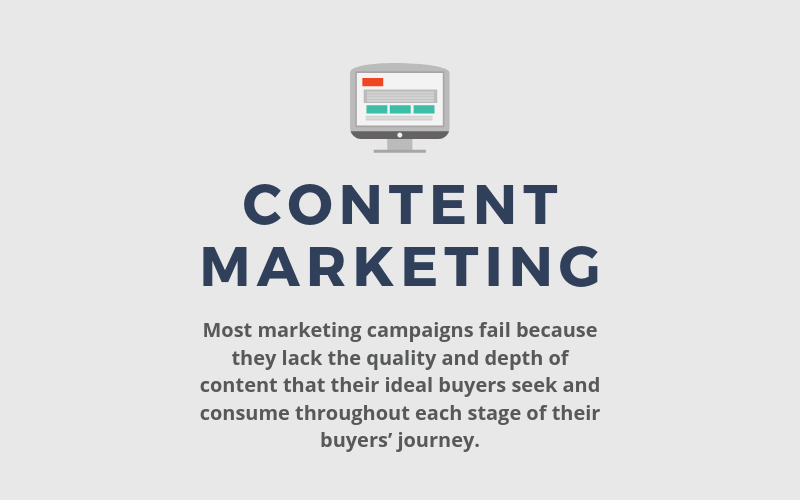
Most marketing campaigns fail because they lack the quality and depth of content that their ideal buyers seek and consume throughout each stage of their buyers’ journey.
Content creation and marketing is the #1 challenge for marketers.
Identifying the information your buyers seek throughout their buyers’ journey is key.
Here is some insight into the type of content needed for each stage of your prospects’ buyers’ journey:
Awareness Stage:
- People are looking for answers, resources, education, research data, opinions, and insight.
- Priority Initiatives – What triggers a prospect to start looking for a product such as yours? What are their priorities and why did these priorities change?
Type of Content
- Whitepaper, eBook, kit, tip sheet, checklist, how-to video, educational webinar
Consideration Stage
- People are doing heavy research on whether your product or service is a good fit for them.
- Success Factors – What are the results they expect from your product? What would a “successful” experience look like?
- Perceived Barriers – What are their perceived barriers to doing business with you?
- Consideration Stage – People are doing heavy research on whether your product or service is a good fit for them.
- Decision Criteria – What features will they use as decision criteria to evaluate and compare alternatives, or to do nothing?
Type of Content
- Product webinar, case study, sample, FAQ, datasheet, demo video
Decision Stage
- People determine exactly what it will take to buy your product or service.
Key Insights:
- Evaluation Journey – What is the decision-making process like and what is the prospect’s role in that process?
Type of Content
- Free trial, live demo, consultation, estimate, coupon
An effective digital marketing strategy includes a detailed content marketing strategy that identifies the content to be developed and published in order to attract prospects and leads for your sales team.
Marketing Technology (MarTech)
.png?width=800&name=Marketing%20Techonology%20(MarTech).png)
Too often marketers really don’t have the best tools and processes to run effective marketing campaigns. They may be using up to 16 different tools or technologies that do not integrate with each other nor share data that marketers need to understand what is working, or not working, and why.
Marketers also cannot manually run all digital campaigns and effectively engage in labor-intensive processes.
MarTech is a big issue today. You need to have a robust marketing automation technology platform that makes your marketing and sales processes more effective and efficient.
MarTech helps you connect your marketing and sales team, and helps you connect with your prospects.
70% of customers say that connected processes, such as seamless handoffs from marketing to sales or contextualized engagement through personalized content based on earlier interactions, are key to winning their business. (Salesforce State of Connected Customer)
It is estimated by Gartner that CMOs will spend more on technology than CIOs. As you develop more quality content and personalize the user experience in your marketing campaigns, you need a technology platform to:
- Collect data and provide key insights into your users’, prospects’, and leads’ experience
- Better understand customers and prospects
- Automate processes to become more efficient in time management
- Provide better user experiences
- Help gain a competitive advantage
- Better manage marketing and sales operations
- Generate more leads and sales opportunities
It is almost impossible to build and run effective marketing campaigns today without a robust marketing and sales technology platform. To be successful, marketing and sales professionals must become proficient users of marketing and sales technology now and in the future.
Digital Marketing Expertise
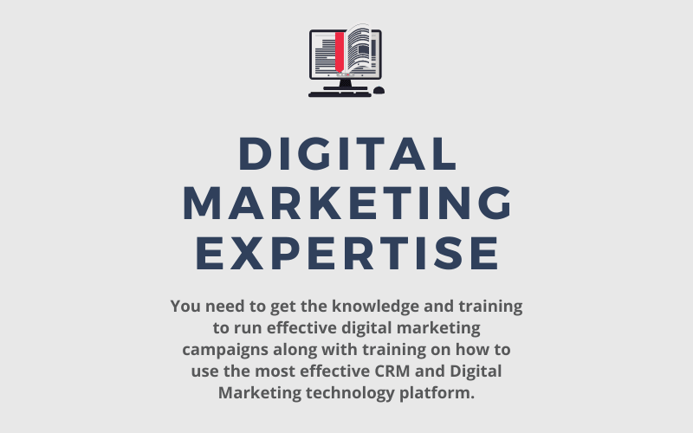
Professional digital marketers must have a comprehensive knowledge of all aspects of digital marketing and its technology including:
- Digital Marketing Strategy
- Content Marketing
- Social Media Marketing
- Search Engine Optimization (SEO)
- Paid Search & Google Ads
- Email Marketing
- Website Optimization
- Google Analytics
- Marketing and Sales Technology
Xcellimark offers you digital marketing and sales training along with HubSpot technology training to help you excel in your digital marketing and sales efforts.
Leadership
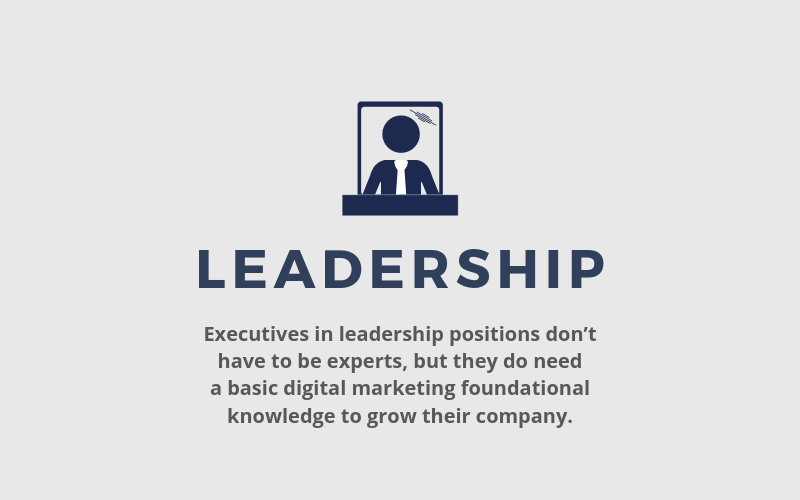
Executives and their leadership teams are significantly challenged by the digital knowledge needed to drive business growth and ultimate success.
According to Burning Glass Technologies, 8 in 10 middle-skill jobs (hint digital marketers) now require digital skills. However, digital skills gaps go beyond just technical skills. They impact business, marketing, and leadership skills as well.
Many industries have been turned upside down by tech-savvy leaders who saw the opportunity to use digital technology to disrupt an industry. These tech-savvy leaders challenge the traditional business model and ultimately drive their companies to become the leading companies in their industry.
How well you manage the digital transformation in your industry and company will determine if your company thrives or not.
The ultimate success and future of a company belong to those companies that have executives and leaders who have at least a basic digital knowledge and skill set.
Up to 59% of employees believe their leadership is NOT digital-savvy.
Leaders who are not digital savvy may think “well that’s not my job and I have people who know that stuff.”
However, a leader or executive who lacks basic digital skills limits their workforce.
It limits employees from developing new ways to help grow and support the business.
It hinders employees from resolving problems.
It hinders the ability of the business to scale efficiently and effectively.
Executives in leadership positions don’t have to be experts, but they do need basic digital marketing knowledge to grow their company.
Learn more about the Xcellimark Digital Marketing and HubSpot Training that will help employees, executives, and company leaders alike.
Conclusion
The business-growth game has changed. Companies no longer control the sales process. Buyers now control the selling process.
It’s all digital – all the time.
You need digital marketing professionals who are trained and experienced to help companies meet their business goals.
While specialization in a digital marketing channel such as SEO, social media, content creation, etc., is beneficial – it does not make you a digital marketing professional.
You need marketing and sales teams working together using a more integrated and cohesive methodology and process. You also need to use the right technology toolset to be efficient and effective.
Marketing teams need updated digital knowledge and training in order to meet and exceed job expectations, marketing and sales objectives, and business goals.
Executive teams and leadership must also help their company by having a basic digital marketing foundation in order to continuously evolve their company in the 24/7, all-digital world and to achieve their business goals year after year.
Learn more about Xcellimark's personalized digital marketing and sales training combined with HubSpot technology training.

Scott Lambert

